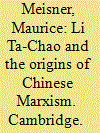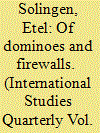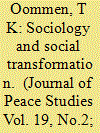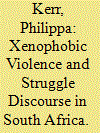|
|
|
Sort Order |
|
|
|
Items / Page
|
|
|
|
|
|
|
| Srl | Item |
| 1 |
ID:
090817


|
|
|
|
|
| Publication |
2009.
|
| Summary/Abstract |
One of the perennial puzzles of Montesquieu's The Spirit of the Laws is whether it has a coherent design. Although the dominant line of thinking is that this work has no unified structure, another believes it to have some organizing principle, even though proposals as to what it may be have failed to convince for lack of ability to account for various features of the work. I propose that The Spirit of the Laws is organized in a dialectical way, juxtaposing the antitheses of human freedom and determination. The tension between these is manifest in the first half of the work and resolved in the middle, and human freedom worked out and advanced in the second half. This article solves the long-standing question of the design of The Spirit of the Laws and reveals that the work's ultimate purpose is to champion human liberty over determination, contrary to the views of those who read the work as deterministic.
|
|
|
|
|
|
|
|
|
|
|
|
|
|
|
|
| 2 |
ID:
038742


|
|
|
|
|
| Publication |
Cambridge, Harvard University Press, 1967.
|
| Description |
xvii, 326p.Hbk
|
|
|
|
|
|
|
|
|
|
|
|
Copies: C:1/I:0,R:0,Q:0
Circulation
| Accession# | Call# | Current Location | Status | Policy | Location |
| 000242 | 923.251/MEI 000242 | Main | On Shelf | General | |
|
|
|
|
| 3 |
ID:
118167


|
|
|
|
|
| Publication |
2012.
|
| Summary/Abstract |
The Great Recession, Euro contagion, Middle East upheavals, nuclear proliferation, and expansion of rights, among others, highlight the centrality of diffusion to international studies. This Presidential Address outlines building blocks for a shared conceptualization of diffusion that is attentive to the initial stimulus; the medium through which information about the stimuli may/may not travel to other destinations; the political agents un/affected by the stimulus' positive or negative externalities, who aid or block the stimulus' journey to other destinations; and outcomes that enable discrimination among grades of diffusion and resulting equilibria. Various issue areas illustrate how initial stimuli may/may not change preferences, transform identities, trigger emotions, alter strategic choices, and affect outcomes. I advance three related considerations. First, to avoid selection bias, understanding what does not diffuse (the "Vegas counterfactual") should be as central as what does. Concepts such as firewalls and sedimentation are essential for gauging a medium's relative immunity/vulnerability to diffusion. Second, weaving domestic, regional, and global considerations into a single analytical framework reduces omitted variable bias and enables systematic cross-regional comparisons. Third, these building blocks imbue the study of diffusion with political dynamics-entailing strategic interaction, contingency, incomplete information, and unintended effects-that defy determinism, automaticity, or teleology. Similar causal mechanisms may yield different outcomes under different domestic, regional, and global conditions. And different mechanisms may yield similar outcomes under comparable circumstances. I highlight the challenges inherent in assessing the outcomes of diffusion given competing empirical findings, epistemologies, and normative readings of what does/does not and should/should not diffuse, and outline an agenda for future research.
|
|
|
|
|
|
|
|
|
|
|
|
|
|
|
|
| 4 |
ID:
114727


|
|
|
| 5 |
ID:
162433


|
|
|
|
|
| Summary/Abstract |
The Danish decision to enter US-led coalitions in Afghanistan and Iraq significantly consolidated and strengthened the Atlantic dimension in Danish foreign policy in the period 2001–2009. The period has attracted considerable academic interest, but there seems to be a lack of consensus about how to interpret the Danish decision, which has been characterised as everything from an indication of adaptation, to continuation of the Danish acquiescence to great powers, to path-breaking change in Danish foreign policy to an expression of small state independence. Part of the confusion in the literature is due to the lack of clear conceptual awareness regarding the concepts in use. This article identifies three frames in the literature and contributes to our understanding of the question of change and continuity in small state foreign and security policy by identifying the analytical implications of adopting a clearer understanding of analytical concepts such as adaptation, determinism, activism and internationalism in the Scandinavian context in general and the Danish context more specifically.
|
|
|
|
|
|
|
|
|
|
|
|
|
|
|
|
| 6 |
ID:
168244


|
|
|
|
|
| Summary/Abstract |
This paper argues that xenophobia in South Africa is entangled in discourses of liberation struggle, which are often used to justify anti-foreigner violence. We first examine some existing academic explanations for xenophobia, namely internalised racism, poverty/inequality, nationalism, and township and informal settlement politics. To avoid deterministically explaining xenophobia as ‘caused’ by any of these factors, however, we introduce a concept from social psychology, the concept of ‘working models of contact’. These are common frames of reference in which contact between groups is understood in terms of shared meanings and values. Xenophobic violence is not caused but instantiated in ways that are explained and justified according to particular understandings of the meaning of the ‘citizen-foreigner’ relationship. We then review three case studies of xenophobic violence whose perpetrators constructed a model of contact in which African ‘foreigners’ were undermining the struggles of South Africans in various socio-economic contexts. We also examine three cases where xenophobic violence was actively discouraged by invoking an inclusive rather than divisive form of struggle discourse. Thus the nature of the struggle itself becomes contested. We conclude by considering some dilemmatic implications that our analysis provokes.
|
|
|
|
|
|
|
|
|
|
|
|
|
|
|
|
|
|
|
|
|